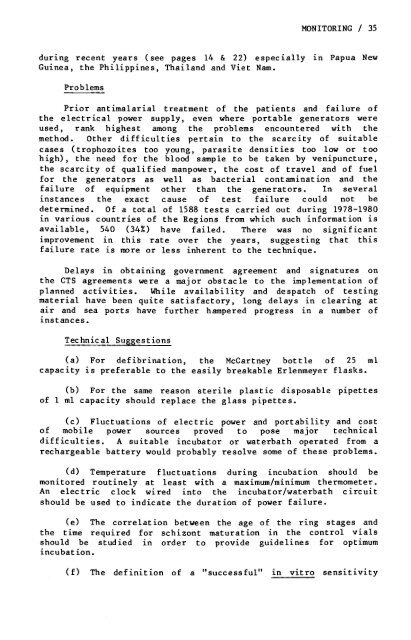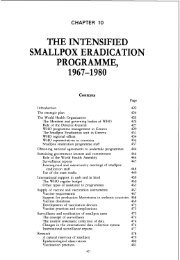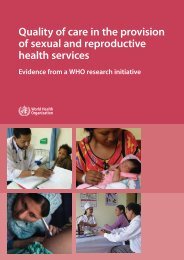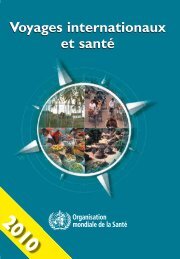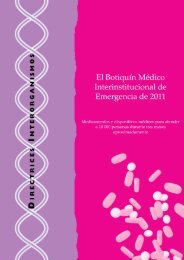Drug-Resistant Malaria - libdoc.who.int - World Health Organization
Drug-Resistant Malaria - libdoc.who.int - World Health Organization
Drug-Resistant Malaria - libdoc.who.int - World Health Organization
Create successful ePaper yourself
Turn your PDF publications into a flip-book with our unique Google optimized e-Paper software.
MONITORING / 35<br />
during recent years (see pages 14 & 22) especially in Papua New<br />
Guinea, the Philippines, Thailand and Viet Nam.<br />
Problems<br />
Prior antimalarial treatment of the patients and failure of<br />
the electrical power supply, even where portable generators were<br />
used, rank highest among the problems encountered with the<br />
method. Other difficulties pertain to the scarcity of suitable<br />
cases (trophozoites too young, parasite densities too low or too<br />
high), the need for the blood sample to be taken by venipuncture,<br />
the scarcity of qualified manpower, the cost of travel and of fuel<br />
for the generators as well as bacterial contamination and the<br />
failure of equipment other than the generators. In several<br />
instances the exact cause of test failure could not be<br />
determined. Of a total of 1588 tests carried out during 1978-1980<br />
in various countries of the Regions from which such information is<br />
available, 540 (34%) have failed. There was no significant<br />
improvement in this rate over the years, suggesting that this<br />
failure rate is more or less inherent to the technique.<br />
Delays in obtaining government agreement and signatures on<br />
the CTS agreements were a major obstacle to the implementation of<br />
planned activities. While availability and despatch of testing<br />
material have been quite sat isfactory, long delays in clearing at<br />
air and sea ports have further hampered progress in a number of<br />
instances.<br />
Technical Suggestions<br />
(a) For defibrination, the McCartney bottle of 25 ml<br />
capacity is preferable to the easily breakable Erlenmeyer flasks.<br />
(b) For the same reason sterile plastic disposable pipettes<br />
of 1 ml capacity should replace the glass pipettes.<br />
(c) Fluctuations of electric power and portability and cost<br />
of mobile power sources proved to pose major technical<br />
difficulties. A suitable incubator or waterbath operated from a<br />
rechargeable battery would probably resolve some of these problems.<br />
(d) Temperature fluctuations during incubation should be<br />
monitored routinely at least with a maximum/minimum thermometer.<br />
An electric clock wired <strong>int</strong>o the incubator/waterbath circuit<br />
should be used to indicate the duration of power failure.<br />
(e) The correlation between the age of the ring stages and<br />
the time required for schizont maturation in the control vials<br />
should be studied 1n order to provide guidelines for optimum<br />
incubation.<br />
(t) The definition of a<br />
"successful" in vitro sensitivity


